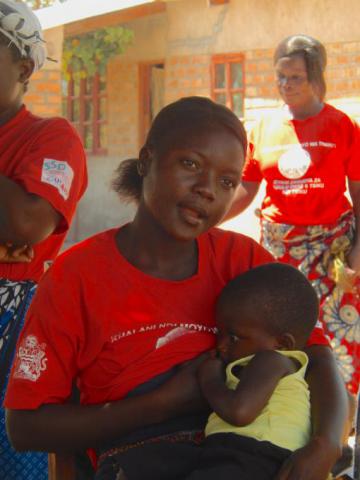From Beneficiary to Agent of Change
Fanny stands confidently in front of a small crowd while demonstrating how to properly breastfeed a child. She holds her son in her arms and explains the importance of direct eye-contact and exclusive breastfeeding during the first six months of a child’s life. As a member of the Chipando village care group in Nkhotakota District, Fanny knows the importance of proper nutrition for herself and her family. Why? Because just one year ago, Fanny was the mother of an underweight child.
Fanny, a 23-year-old mother of two, was one of the households visited by the local care group. Typically consisting of 10-15 volunteers, care groups are responsible for regularly visiting households to share health education messages, to support behavior change activities at the household level, and to refer people to the health facilities when necessary.
“When the care group visited my house last year, they told me that my son was underweight. I needed help.” With the care group members support, Fanny was taught how to prepare nutritious food for her family and how to properly breastfeed. “I was really happy to learn,” she said. “The care group noticed how interested I was in making my family healthier and asked me to join the group too.”
Fanny’s care group was established as part of SSDI-Services, a USAID funded programme promoting health-seeking behavior and improving access to and quality of an essential health package (EHP) of services, including nutrition, delivered at both the health facility and community levels. The SSDI nutrition programme aims to prevent malnutrition and have a maximum positive impact on a child’s ability to grow and learn; and to identify, manage, and treat malnourished children through the Community Management of Acute Malnutrition (CMAM) and SUN interventions.
Through SSDI-Services, care groups like Fanny’s are trained and empowered to promote optimal nutrition behaviors for pregnant and lactating women and under-5 children. Trainings focus on strengthening knowledge, skills and action to improve nutrition through household visits focused on nutrition education and counseling, nutrition assessment using MUAC for early detection and referral of children and pregnant and lactating women with acute malnutrition, cooking demonstrations to promote recipes that encourage appropriate food choices and combinations, food and dietary diversity and appropriate food preparation and cooking methods, active feeding and food hygiene.
Now, Fanny is an agent of change in her community, visiting 15 households every month and encouraging parents to prepare different types of foods to help their children grow and concentrate in school. She also teaches people about growing drought resistant crops. “In our village, the rains are unpredictable and there isn’t enough food,” said Fanny. Using land provided by local leaders, Fanny and the other care group members show households what foods are locally available and how to grow and properly prepare them year round. They also cook porridge for children in the mornings, hold monthly cooking demonstrations, and support local health providers with regular growth monitoring activities.
As a result of Fanny and her fellow care group members, Chipando has experienced significant progress toward reducing cases of acute malnutrition. “When SSDI-Services started we saw a lot of child mortality and a lot of malnourished children,” she said. “No we see very few cases.” In fact, when SSDI began in 2012, 11 children were referred for CMAM services. Four years later, there are zero registered cases in Chipando. By working closely with traditional local leaders, Fanny and her care group have been able to scale up efforts in addressing malnutrition.
“I became a member of the care group because I’ve personally experienced the importance and benefit of their work. Because of the advice I received, my kids are now healthy and we have adopted the behaviors we were taught by the care group. I’ve seen this in the other households we visit too.”
SSDI-Services began work in Chipando Village in 2012 and continued supporting the care groups through 2016 when the project came to a close.
Written by Alicia Adler, Programme Officer-Global Health Corps Fellow
 Malawi
Malawi 